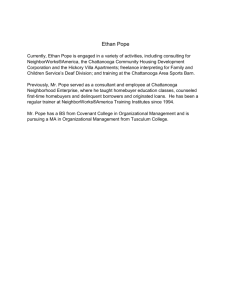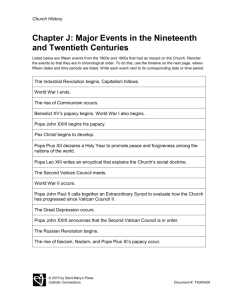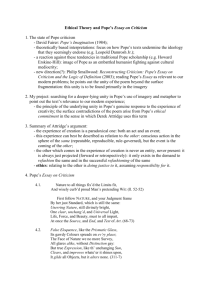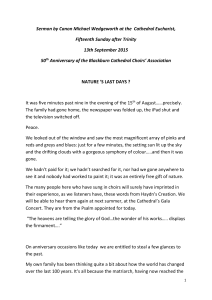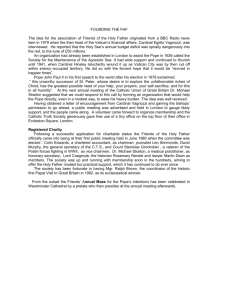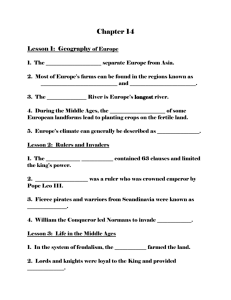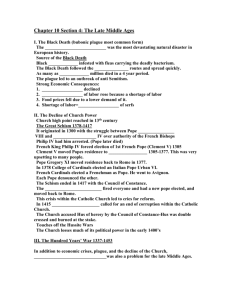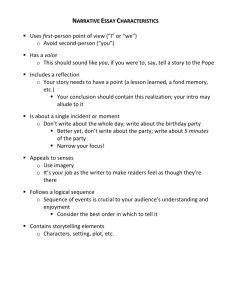alexander pope an essay on criticism
advertisement
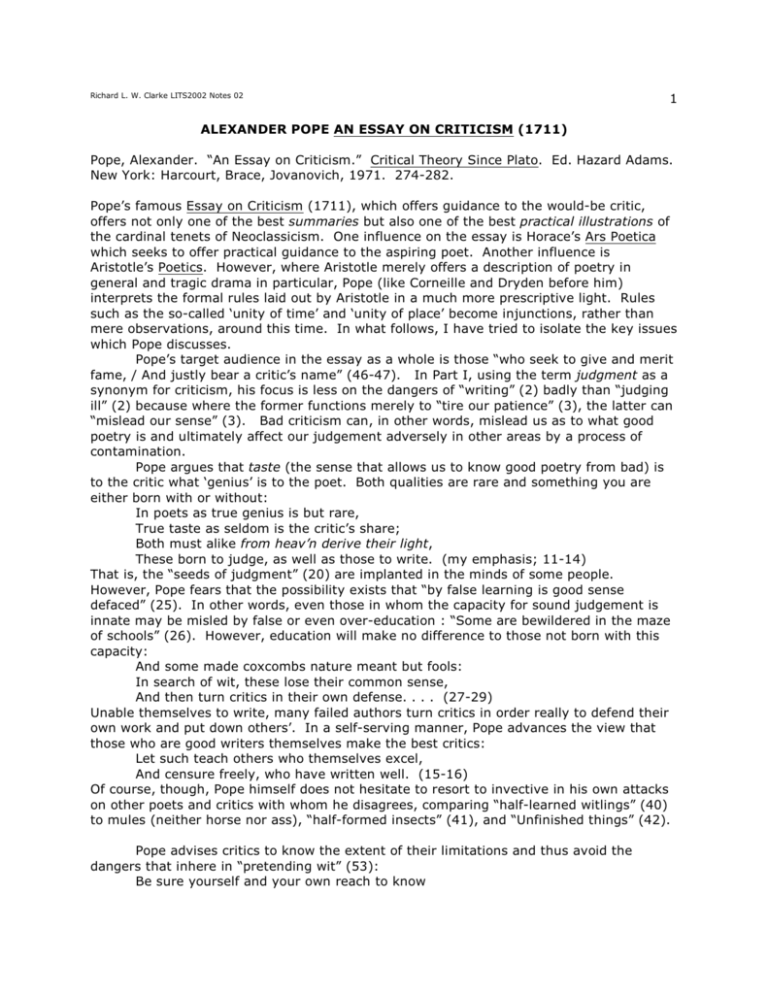
Richard L. W. Clarke LITS2002 Notes 02 1 ALEXANDER POPE AN ESSAY ON CRITICISM (1711) Pope, Alexander. “An Essay on Criticism.” Critical Theory Since Plato. Ed. Hazard Adams. New York: Harcourt, Brace, Jovanovich, 1971. 274-282. Pope’s famous Essay on Criticism (1711), which offers guidance to the would-be critic, offers not only one of the best summaries but also one of the best practical illustrations of the cardinal tenets of Neoclassicism. One influence on the essay is Horace’s Ars Poetica which seeks to offer practical guidance to the aspiring poet. Another influence is Aristotle’s Poetics. However, where Aristotle merely offers a description of poetry in general and tragic drama in particular, Pope (like Corneille and Dryden before him) interprets the formal rules laid out by Aristotle in a much more prescriptive light. Rules such as the so-called ‘unity of time’ and ‘unity of place’ become injunctions, rather than mere observations, around this time. In what follows, I have tried to isolate the key issues which Pope discusses. Pope’s target audience in the essay as a whole is those “who seek to give and merit fame, / And justly bear a critic’s name” (46-47). In Part I, using the term judgment as a synonym for criticism, his focus is less on the dangers of “writing” (2) badly than “judging ill” (2) because where the former functions merely to “tire our patience” (3), the latter can “mislead our sense” (3). Bad criticism can, in other words, mislead us as to what good poetry is and ultimately affect our judgement adversely in other areas by a process of contamination. Pope argues that taste (the sense that allows us to know good poetry from bad) is to the critic what ‘genius’ is to the poet. Both qualities are rare and something you are either born with or without: In poets as true genius is but rare, True taste as seldom is the critic’s share; Both must alike from heav’n derive their light, These born to judge, as well as those to write. (my emphasis; 11-14) That is, the “seeds of judgment” (20) are implanted in the minds of some people. However, Pope fears that the possibility exists that “by false learning is good sense defaced” (25). In other words, even those in whom the capacity for sound judgement is innate may be misled by false or even over-education : “Some are bewildered in the maze of schools” (26). However, education will make no difference to those not born with this capacity: And some made coxcombs nature meant but fools: In search of wit, these lose their common sense, And then turn critics in their own defense. . . . (27-29) Unable themselves to write, many failed authors turn critics in order really to defend their own work and put down others’. In a self-serving manner, Pope advances the view that those who are good writers themselves make the best critics: Let such teach others who themselves excel, And censure freely, who have written well. (15-16) Of course, though, Pope himself does not hesitate to resort to invective in his own attacks on other poets and critics with whom he disagrees, comparing “half-learned witlings” (40) to mules (neither horse nor ass), “half-formed insects” (41), and “Unfinished things” (42). Pope advises critics to know the extent of their limitations and thus avoid the dangers that inhere in “pretending wit” (53): Be sure yourself and your own reach to know 2 How far your genius, taste, and learning go; Launch not beyond your depth, but be discreet, And mark the point where sense and dullness meet. (48-51) The reason for this is that Nature to all things fixed the limits fit, And wisely curbed proud man’s pretending wit. . . . One science only will one genius fit; So vast is art, so narrow human wit: Not only bounded to peculiar arts, But oft in those confined to single parts. (52-63) This is why Pope contends later that the greatest flaw which afflicts the minds of critics is pride: Of all the causes which conspire to blind Man’s erring judgment, and misguide the mind, What the weak head with strongest bias rules, Is pride, the never failing vice of fools. What nature has in worth denied, She gives in large recruits of needful pride. . . . Pride, where wit fails, steps into our defense, And fills up all the mighty void of sense; If once right reason drives that cloud away, Truth breaks upon us with resistless day. . . . A little learning is a dang’rous thing; Drink deep, or taste not the Pierian spring. There shallow draughts intoxicate the brain, And drinking largely sobers the brain. (201-216) Pope’s view is that the critic, like any person who seeks to be wise, must seek to know his subject thoroughly. A lot of harm can be done by those who have only a surface acquaintance with the subject of their investigation. Pope advises critics to use nature (a synonym for ‘reality’ untainted by human intervention) as the standard by which to judge art: First follow nature, and your judgement frame By her just standard, which is still the same. (68-69) Humans may differ from each other in various places and over time. However, nature is eternal and universal: it is the “clear, unchang’d, and universal light” (71) that is “At once the source, and end, and test of art” (85). For Pope, what the great writers know is that fidelity to nature is the cornerstone of all art, hence, the importance of respecting those time-tested rules laid down by the ‘Ancients.’ As a result, another cardinal tenet of Neoclassicism, one derived from the first, is the veneration for Tradition, that is, emulation of the rules laid down by the Ancients in their works of theory (e.g Aristotle’s Poetics) and put into practice in their poetry. Pope advises the would-be critic to “Learn . . . for ancient rules a just esteem” (139). Those rules of old discovered, not devised, Are nature still, but nature methodized: Nature, like liberty, is but restrained By the same laws which first herself ordained . . . Just rules from great examples giv’n, We drew from them what they derived from heav’n: The gen’rous critic fanned the poet’s fire, And taught the world with reason to admire. 3 Then criticism the Muse’s handmaid proved, To dress her charms, and make her more beloved. . . . You then whose judgment the right course would steer, . . . Be Homer’s works your study and delight, Read them by day and meditate by night; Thence form your judgement, thence your maxims bring, And trace the Muses upward to their spring; (88-127) What poets such as Virgil discovered is that “Nature and Homer” (135) are “the same” (135). Hence, “To copy nature is to copy them” (140). Acknowledging that some esteemed ancient writers such as Shakespeare did not follow the rules laid down by the Ancients, Pope contends that there are Some beauties yet, no precepts can declare For there’s a happiness as well as care. (141) In other words, there are certain “nameless graces which no methods can teach” (144) which a “master-hand alone can reach” (158). However, his point is that such exceptions justify the rules. In some case, they were sometimes necessitated, at least at first, in the case of Ancient writers blazing a new path where there were no rules to guide them and who had no choice, accordingly, but to rely solely on “lucky licence” (148): If, where the rules not far enough extend, (Since rules were made but to promote their end) Some lucky license answer to the full Th’intent proposed, that license is a rule. Thus Pegasus a nearer way to take, May boldly deviate from the common track, Great wits sometimes may gloriously offend And rise to faults true critics dare not mend Which without passing through the judgment, gains The heart, and all its end at once attains. (150-157). In such cases, Pope argues, what matters is the goal ultimately reached, even though by unconventional means. This is why he warns: Moderns, beware! or if you must offend Against the precept, ne’er transgress its end; Let it be seldom, and compelled by need; And have, at least, their precedent to plead. . . (163-166) Pope compares such artistic deviations to nature where, he points out, “in prospects . . . some objects please our eyes, / Which out of nature’s common order rise, / The shapeless rock, or hanging precipice” (158-160). It is precisely such innovative exceptions to the rules, whether in the natural world or the world of art, which the Romantics (1785-1830) would later admire so. In Part II, Pope argues that the true critic must judge a work in accordance with the writer’s intention: “A perfect judge will read each work of wit / With the same spirit that its author writ” (233-234). No critic should expect to read a perfect work: Whoever thinks a faultless piece to see, Thinks what ne’er was, nor is, nor e’er shall be. (253-254) Moreover, critics must not judge a writer on the basis of what he did not set out to do and to give praise where praise is due: In every work regard the writer’s end, Since none can compass more than they intend; And if the means be just, the conduct true, Applause, in spite of trivial faults, is due. (255-258) 4 Pope advises the critic to consider a work in its entirety and not to zero in on the faults which affect particular parts of a work: Survey the whole, nor seek slight faults to find Where nature moves, and rapture warms the mind; Nor lose for that malignant dull delight, The gen’rous pleasure to be charmed with wit. . . . In wit, as nature, what affects our hearts Is not th’exactness of peculiar parts; ‘Tis not a lip, or eye, we beauty call, But the joint force and full result of all. (235-246) The obsession with particular parts is a danger which critics would do well to avoid: Most critics, fond of some subservient art, Still make the whole depend upon a part: They talk of principles, but notions of prize, And all to one loved folly sacrifice. . . . Thus critics of less judgment than caprice . . . Form short ideas, and offend in arts (As most in manners) by a love to parts. (263-288) By focusing on bits and pieces of a work, with which one can always find fault, the achievement of the whole is ignored, Pope argues. For example, Pope warns, some critics pay undue attention to the figurative language (‘conceits’ are images, i.e. metaphors, similes, etc.) found in a work which can be overdone. Such critics “for language all their care express, / And value books, as women men, for dress: . . . / The sense, they humbly take upon content” (305-308) (i.e. they accept the meaning or content on faith). Privileging form over substance, they to conceit alone their taste confine And glitt’ring thoughts struck out at ev’ry line; Pleased with a work where nothing’s just or fit; One glaring chaos and wild heap of wit. (289-292). They favour lesser poets who, “unskill’d to trace / The naked nature and living grace” (293-294), often ‘With gold and jewels cover every part, / And hide with ornaments their want of art” (295-296). Pope warns against what he calls ‘false eloquence’ which deceives those critics who focus more on form than content: Words are like leaves; and where they most abound, Much fruit of sense beneath is rarely found. False eloquence, like the prismatic glass, Its gaudy colours spreads on ev’ry place; The face of nature we no more survey, All glares alike, without distinction gay; (309-314) Arguing that “works may have more wit than does them good” (303), Pope’s point is that the poet should use his wit sparingly and selectively because “As shades more sweetly recommend the light, / So modest plainness sets off sprightly wit” (301-302). He concludes: True wit is nature to advantage dressed, What oft was thought, but ne’er so well expressed Something whose truth convinced at sight we find, That gives us back the image of our mind. (297-300) He continues: . . . true expression, like th’ unchanging sun, Clears and improves whate’er it shines upon; 5 It gilds all objects but it alters none. Expression is the dress of thought, and still Appears more decent, as more suitable. (315-319) In other words, implicitly alluding critically to the work of John Donne and the Metaphysicals, Pope is of the view that true wit involves the occasional use of the most fitting, rather than outlandish, comparisons in order to express a truism that the reader is able almost instinctively to recognise and to assent to. Later, Pope advises that critics should follow the middle path in all things, moderation being the key word: Avoid extremes, and shun the fault of such Who still are pleased too little or too much. (384-385) Balance here, as in everything else, is the key. In terms of diction, Pope suggests that “diff’rent styles with diff’rent subjects sort, / As several garbs with country, town, and court” (322-323). Pope accordingly warns against slavish use of out of date words: such writers merely “mimic ancient wits at best, / As apes our grandsires, in their doublets dressed” (331-332). Therefore, Pope advises poets “Be not the first by whom the new are tried, / Nor yet the last to lay the old aside” (335-336). Pope then turns his attention to the question of metre or “numbers” (337), as it was often called then, and the tendency on the part of some critics to simplistically divide metre into either “smooth or rough” (338), “right or wrong” (338). He warns against liking rhythm merely for the sake of rhythm: Her voice is all these tuneful fools admire; Who haunt Parnassus but to please their ear, Not mend their minds; as some to church repair Not for the doctrine, but the music there. (340-343) Such critics study poetry only for the ‘dulce’ and not for the ‘utile.’ His point is also that regularity of rhythm (what Pope calls “equal syllables” [344]) is not the end all and be all of poetry because it can sometimes be used as a vehicle for bad poetry, examples of which Pope provides. Turning his attention to the related question of ‘rhyme,’ Pope excoriates the predictable ones inherited from traditional usage (e.g ‘breeze’ with ‘trees’ or ‘creep’ and ‘sleep’). Sound must, rather, convey sense: ‘Tis not enough no harshness give offense; The sound must seem an echo to the sense. (364-365) Pope offers numerous examples to illustrate the correct coupling of sound with sense (see ll. 366-383). Pope argues that critics should avoid narrow nationalist or sectarian prejudice which can only lead to misjudgements: Some foreign writers, some our own despise; The ancients only, or the moderns prize. Thus wit, like faith, by each man is applied To one small sect, and all are damned beside. (394-397) He warns of the danger posed by subjectivism, parochialness and partiality in general to the fashioning of true judgments: Some, valuing those of their own side or mind, Still make themselves the measure of mankind: Fondly we think we honor merit then, When we but praise ourselves in other men. Parties in wit attend on those of state, And public faction doubles private hate. (452-457) Pope also warns critics against following the trends of the present rather than what is 6 correct: If faith itself has diff’rent dresses worn, What wonder modes in wit should take their turn? Oft leaving what is natural and fit, The current folly proves the ready wit. (446-449) He warns in this regard against the tendency to think that one knows more than one’s elders: “We think our fathers fools, so wise we grow; / Our wiser sons, no doubt, will think us so” (438-439). Comparing wit to the sun which shines on everything since the earth began, Pope argues that wit is universally and eternally true as a result of which “Regard not then if wit be old or new, / But blame the false, and value still the true” (406-407). Pope warns critics, also, of the vital importance of using one’s own judgment and not merely following the herd: Some ne’er advance a judgment of their own But catch the spreading notion of the town; They reason and conclude by precedent. (408-410) Where the “vulgar . . . through imitation err” (424), the opposite extreme is also possible: he criticises the “learned” (425) for being “singular; / So much they scorn the crowd, that if the throng / By chance go right, they purposely go wrong” (425-427). Pope also criticises in this regard fickleness and advocates consistency: A Muse by these is like a mistress used, This hour she’s idolised, the next abused; While their weak heads, like towns unfortified, ‘Twixt sense and nonsense daily change their side. (431-434) As a result, “Some praise at morning what they blame at night, / But always think the last opinion right” (429-430). Pope also cautions against those who focus on the person who wrote the work and not on the work itself: they “judge of authors’ names, not works, and then / Nor praise nor blame the writings, but the men” (412-413). The worst example of this is the kind of critic who praises rich patrons: he is a “constant critic at the great man’s board, / To fetch and carry nonsense for my lord” (416-417). Sometimes, it is “ign’rance” (508) which prompts critics to attack authors. At other times, it is “learning” (509) itself which takes delight in attacking wit: Now, they who reach Parnassus’ lofty crown, Employ their pains to spurn some others down And while self-love each jealous writer rules, Contending wits become the sport of fools. . . . To what base ends, and by what abject ways, Are mortals urged through sacred lust of praise! (514-521) Whatever the motive of critics, Pope writes, authors of abundant wit are the inevitable target of others’ envy: “Envy will merit, as its shade pursue” (466). However, he comforts himself with the thought that envy like a shadow, proves the substance true: For envied wit, like Sol eclipsed, makes known Th’opposing body’s greatness, not its own” (467-469). However, Pope points out that even the possession of wit itself is no compensation for the envy which it attracts: “Unhappy wit, like most mistaken things, / Atones not for that envy which it brings” (494-495). The reason for this is that wit is ephemeral: Like some fair flow’r the early spring supplies, That gaily blooms, but ev’n in blooming dies. What is this wit, which must our cares employ? 7 The owner’s wife, that other men enjoy; Then most our trouble still when most enjoyed. (498-502) Even fame is temporary and increasingly short-lived: he points out that by contrast to the days of yore “When patriarch wits survived a thousand years” (479), nowadays “fame (our second life) is lost, / And bare threescore is all ev’n that can boast” (480-481) because “Our sons their fathers’ failing language see” (481). As a result, Pope says: “Be thou the first true merit to befriend; / His praise is lost, who stays till all commend” (474-475). He urges “noble minds” (526) to direct their “spleen and sour disdain” (527) against “more provoking crimes” (528): to be precise, “vile obscenity” (530): “These monsters, critics! with your darts engage, / Here point your thunder, and exhaust your rage!” (534-535). In the final section, Pope concludes by offering the following moral advice to wouldbe critics who perform an important function in this regard: C be truthful: “in all you speak, let truth and candor speak” (563); C hold your tongue where necessary and be humble: “Be silent always when you doubt your sense, / And speak, though sure, with seeming diffidence” (566-567); C be self-critical: “with pleasure own your errors past, / And make each day a critique on the last” (570-571); C be diplomatic: “Blunt truths more mischief than nice falsehoods do; / Men must be taught as if you taught them not, / And things unknown proposed as things forgot” (573-575); C be generous with your advice: “Be niggards of advice on no pretense, / For the worst avarice is that of sense” (578-579); C do not fear to be honest to those who seek your advice: “With mean complaisance ne’er betray your trust, / Nor be so civil as to prove unjust. / Fear not the anger of the wise to raise; / Those best can bear reproof, who merit praise” (580-583); and C let dull wits condemn themselves out of their own mouths: “‘Tis best sometimes your censure to restrain, / And charitably let the dull be vain; / Your silence there is better than your spite” (586-588). Pope acknowledges the guiding hand in all this of Horace whom he describes as “supreme in judgment, as in wit” (657) and whose “precepts teach but what his works inspire” (660). Pope concludes by briefly tracing the history of literature from Dionysius in ancient Greece to the reawakening of learning during the European Renaissance. He argues against (what might be today called) the cultural nationalism of earlier generations of Englishmen who “foreign laws, despised, / And kept unconquered, and uncivilised; / Fierce for the liberties of wit, and bold / we still defied the Romans as of old” (715-718). However, he praises his own generation as well as those immediately preceding it for their openness to eternally and universally recognised truths, no matter what their national or historical provenance, an openness epitomised by their return to the precepts promulgated by the Ancients: Yet some there were, among the sounder few Of those who less presumed, and better knew, Who durst assert the juster ancient cause, And here restored wit’s fundamental laws. (719-722)

